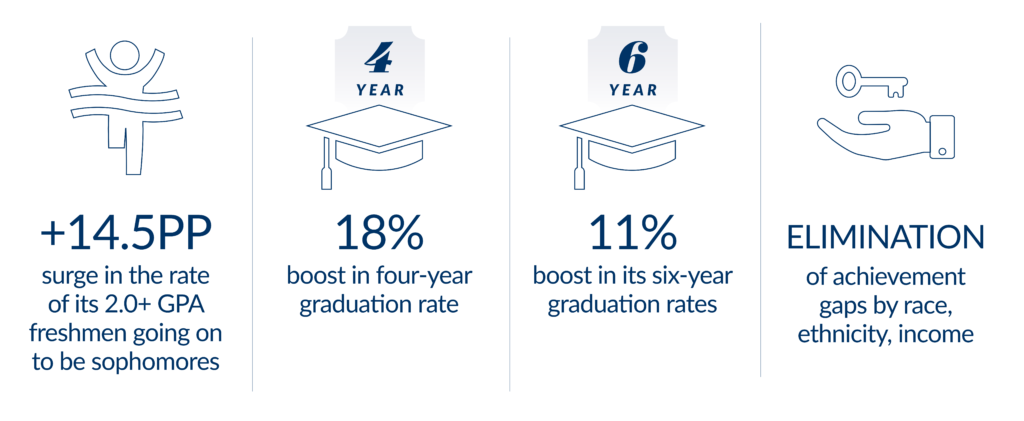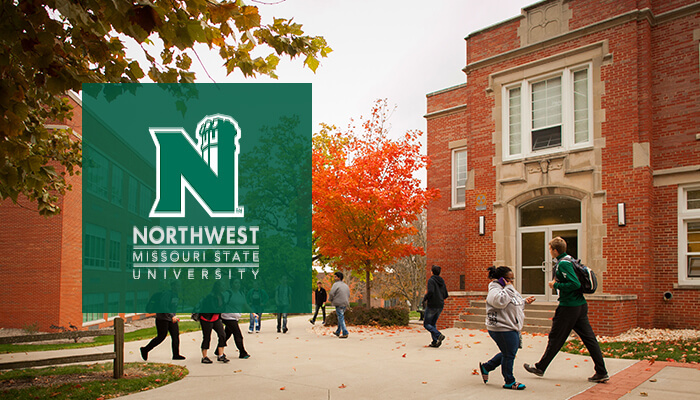
Using Student Success Analytics to Eliminate Equity Gaps
Share this Post
One public Florida university leveraged its data analytics to dramatically increase first-year retention, improve completion, and eliminate equity gaps in the categories of race, ethnicity, and income.
When the state of Florida introduced performance-based funding, motivated to become the country’s fastest-improving public research university for its diverse student body, leaders got to work on addressing student needs, improving outcomes, and meeting new state standards. Their objective was to radically improve student success outcomes by equipping the entire institution with intelligence and actionable insights. Leaders partnered with Civitas Learning to build a robust analytics infrastructure and data culture.
Building a Data Analytics Infrastructure and Culture
Leaders recognized that they needed a multi-faceted approach to create a data analytics infrastructure and culture on their campus. This realization led to several cross-functional teams, including a strategic workgroup, central data governance team, student engagement team, and student success networks. Together these teams used data to understand student experiences and the effectiveness of student success practices and initiatives. This integration of data analytics across their campus allowed them to take data-activated, coordinated action to help their students succeed.
First, leaders created a centralized strategic team to review data and strengthen metric improvement strategies. They worked to remove long-existing silos, ensure accountability, and advocate for sustained interventions. This diverse, multi-level strategic team of administrators, budget analysts, IR programmers, faculty, and support services met weekly to review data, evaluate student success initiatives, and design sustained interventions to improve outcomes. Success required more than having the right tools. It depended on having the right people at the table and a concentrated effort to take action.
Then leaders formed a Civitas Data Governance Team (CDGT) to work closely with the centralized strategic team to turn insights into action. The CDGT ensured campus teams had student-level, timely intelligence they needed to coordinate action and improve student success outcomes. Centralized data governance meant using real-time student data analytics to optimize programs and allocate resources to the most beneficial interventions for their students. It empowered student success teams to avoid often-too-late reactions to at-risk students. This real-time visibility into student needs allowed student success professionals to engage with students early when challenges were manageable and mistakes were still salvageable.
Enabling Holistic Student Support
To improve the quality of their student outreach, leaders also created a student engagement or “nudge” team. This team of professionals from advising, financial aid, the registrar, and campus marketing used data analytics to design thoughtful, relevant outreach campaigns and improve student communication. Student data revealed insights that enabled lead advisors to send more personalized nudges, scaling timely and effective outreach to their students. The registrar and student services team used short-cycle analytics to coordinate student outreach and better understand the effectiveness of communication campaigns.
To deliver a seamless advising experience, leaders established team-based Success Networks. These teams, composed of an assigned academic advisor, career counselor, and financial aid counselor, used data to deliver personalized support. This approach enabled professionals to ease a student’s ability to schedule an appointment. The team eased their workload and streamlined their internal processes by moving their notes and records from a disparate, siloed system to a centralized one.
The Success Networks also integrated predictive analytics to improve their ability to identify students who needed support—knowing which students were predicted least likely to persist equipped the Success Networks with the ability to intervene proactively. This shared understanding of real-time student risk and access to centralized information enabled the network to take coordinated action to connect students to the resources they needed to succeed.
Taking an Institution-Specific Approach to Student Success
Before data analytics provided leaders with clarity about their student’s actual experiences, narratives and myths informed many of their student success practices and programs. Resulting, far too often, in their teams delivering inadequate interventions to students. They learned that continuous improvement of student success relied on inclusive data-informed strategies, organizational change, and coordinated outreach across the university to address the needs of their students.
Real-time visibility into their student data revealed that applying best practices and the latest higher ed trends was often not impactful for a diverse student population. Their shift in approach led to the creation of initiatives and actions tailored to meet the needs of their students- including step-by-step roadmaps for all students, a more flexible Bachelor of general studies, progressive academic grants, and more. By looking closer at their programs and policies, they could remove barriers they didn’t see before, improve equity and eliminate their student achievement gap.
Transition to Data-Activated Student Impact Strategies Lead to Dramatic Improvements
This shift to data-activated Student Impact Strategies using the Civitas Learning® Student Impact Platform led to improvements across multiple key success indicators. First-year retention for students with a 2.0 or higher surged by 14.5 percentage points. Graduation rates improved, with four-year graduation rates improving by 18% and six-year graduation rates improving by 11%. And most impressively, these efforts eliminated achievement gaps by race, ethnicity, and income.

A close look at their programs and policies’ impact on their students empowered them to remove barriers they didn’t see before. A partnership with Civitas Learning unleashed the true power and potential of the university’s student impact data. Together, they created a data analytics infrastructure and data culture that equipped the entire university to understand their student’s journeys better and provide precise interventions to help them succeed.


